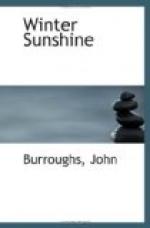The genuine apple-eater comforts himself with an apple in its season, as others do with a pipe or a cigar. When he has nothing else to do, or is bored, he eats an apple. While he is waiting for the train he eats an apple, sometimes several of them. Whe he takes a walk he arms himself with apples. His traveling-bag is full of apples. He offers an apple to his companion, and takes one himself. They are his chief solace when on the road. He sows their seed all along the route. He tosses the core from the car winedow and from the top of the stage-coach. He would, in time, make the land one vast orchard. He dispenses with a knife. He prefers that his teeth shall have the first taste. Then he knows that the best flavor is immediately beneath the skin, and that in a pared apple this is lost. If you will stew the apple, he says, instead of baking it, by all means leave the skin on. It improves the color and vastly heightens the flavor of the dish.
The apple is a masculine fruit; hence women are poor apple-eaters. It belongs to the open air, and requires an open-air taste and relish.
I instantly sympathized with that clergyman I read of, who on pulling out his pocket-handkerchief in the midst of his discourse, pulled out two bouncing apples with it that went rolling across the pulpit floor and down the pulpit stairs. These apples were, do doubt, to be eaten after the sermon, on his way home, or to his next appointment. They would take the taste of it out of his mouth. Then, would a minister be apt to grow tiresome with tow big apples in his coat-tail pockets? Would he not naturally hasten along to “lastly” and the big apples? If they were the dominie apples, and it was April or May, he certainly would.
How the early settlers prized the apple! When their trees broke down or were split asunder by the storms, the neighbors turned out, the divided tree was put together again and fastened with iron bolts. In some of the oldest orchards one may still occasionally see a large dilapidated tree with the rusty iron bolt yet visible. Poor, sour fruit, too, but sweet in those early pioneer days. My grandfather, who was one of these heroes of the stump, used every fall to make a journey of forty miles for a few apples, which he brought home in a bag on horseback. He frequently started from home by two or three o’clock in the morning, and at one time both he and his horse were much frightened by the screaming of panthers in a narrow pass in the mountains through which the road led.
Emerson, I believe, has spoken of the apple as the social fruit of New England. Indeed, what a promoter or abettor of social intercourse among our rural population the apple has been, the company growing more merry and unrestrained as soon as the basket of apples was passed round! When the cider followed, the introduction and good understanding were complete. Then those rural gatherings that enlivened the autumn in the




